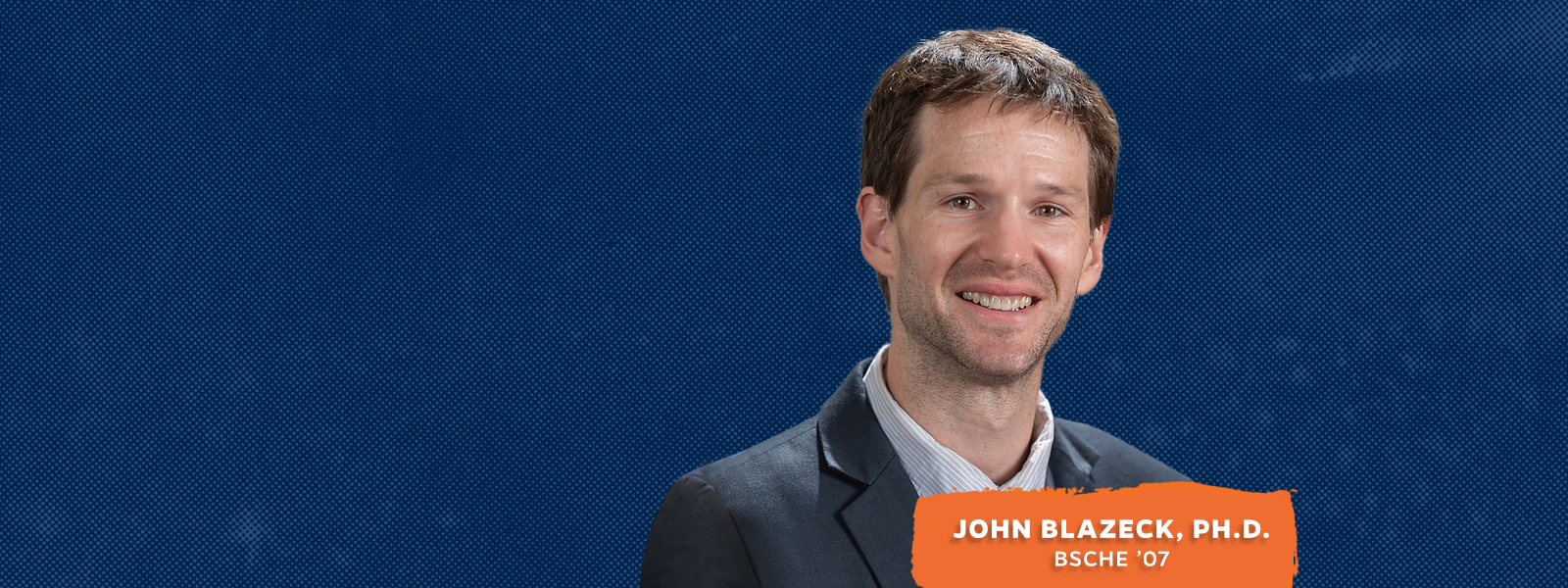At the Graduate Association of Chemical Engineers (GRACE) annual Symposium, John Blazeck, Ph.D. (ChE B.S. ’07), delivered a captivating keynote speech on his research and shared two big-picture ideas for combating cancer. He is exploring two innovative approaches to help the body fight cancer: using enzymes to fix cancer cells’ metabolism to boost the body’s immune system and using genetic engineering to directly control the cells of the immune system to fight solid tumors.
“First, I talked about how we can use an engineered enzyme to ‘correct’ aspects of cancer cell metabolism that have gone haywire. Surprisingly, by correcting these metabolic features, the body’s immune system can fight cancer cells better,” Dr. Blazeck said. “Second, I talked about how we directly control cells of the immune systems (using genetic engineering) to better fight solid tumors.”
Dr. Blazeck is an assistant professor of chemical and biomolecular engineering at the Georgia Institute of Technology. The Blazeck Immunological and Cellular Engineering Lab tackles challenges at the interface of immunology, engineering, and metabolism to improve human health. They utilize their expertise in cellular and protein engineering to control biological function and to develop novel therapies to fight disease.
Dr. Blazeck has been recognized nationally with several prestigious awards and honors, including an American Cancer Society Fellowship; a National Merit Scholarship; an Arnold and Mabel Beckman Foundation Beckman Young Investigator Award, and more recently, a New Innovator Award from the National Institute of Health’s high-risk, high-reward research program.
Dr. Blazeck graduated summa cum laude from the University of Florida in 2007 with a B.S. in chemical engineering. He obtained a Ph.D. from the University of Texas at Austin, performing research with Hal Alper, Ph.D., to engineer microbial hosts to produce biofuels. He continued his research career as a Postdoctoral Fellow at UT Austin, working with George Georgiou, Ph.D., to engineer a cancer-fighting enzyme. He recently shared some comments about his time at UF.
Q: What is your favorite memory of your time as a student?
A: It’s hard to pick, as there was so much to do and so many wonderful people that I met while at UF. But all my favorite memories are with the same group of friends, just at different places.
Q: Who influenced you during your time at UF?
A: I was fortunate to be influenced and guided to my current career as a professor (which I love!) by many people while at UF. I still quote the very first person I talked to at UF about chemical engineering. During my sophomore year, I realized that computer engineering was not the major for me. As I was looking into other programs I spoke to Cynthia Sain, the chemical engineering undergraduate advisor. She told me that, and I’m paraphrasing because it has been more than few years, “chemical engineers invent new things and make old things better.” I decided to start taking Material and Energy Balances right away.
I was also influenced by many of the excellent teachers and research advisors that I had while at UF, like Dr. Oscar Crisalle, Dr. Jason Butler, and Dr. Kirk Ziegler. Dr. Ziegler was the first person to introduce me to laboratory research (actually inventing new things!), and I will always be thankful to him and his Ph.D. student, Carlos Silvera Batista, for their mentorship.
Q: What advice do you have for current students?
A: Be creative, work hard, and ask for guidance earlier rather than later! And go to the beach while you are close to it.

